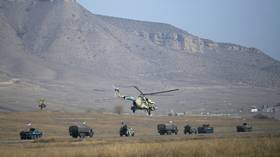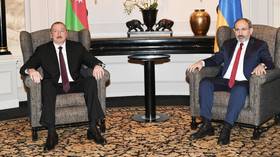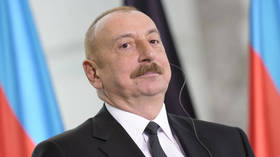Russian troops to withdraw from Karabakh – ex-Armenian PM

Russian peacekeeping forces in Nagorno-Karabakh might soon leave the disputed region, former prime minister of Armenia Hrant Bagratyan told a party rally in Yerevan last Friday. The presence of Russian troops there would make little sense as soon as Baku and Yerevan strike a peace deal, he explained.
Moscow’s peacekeeping mission in the area has already become “problematic” because of Yerevan’s own policies, Bagratyan, leader of Armenia’s opposition Freedom Party, claimed, adding that it is unclear why Russia “should do Armenians a favor” and ensure peace and security in the region if Yerevan officially recognizes it as a part of Azerbaijan.
Nagorno-Karabakh was an autonomous region within Soviet Azerbaijan with an ethnic Armenian majority. It broke away from Azerbaijan even before Baku declared independence from the USSR, triggering an ethnic conflict that claimed thousands of lives before it was frozen by a 1994 truce. The region then enjoyed steady support from Yerevan.
2020 saw a major flare-up that resulted in Azerbaijani troops advancing to cut off the main road between Nagorno-Karabakh and Armenia proper. The conflict ended with a truce mediated by Russia which involved a Russian peacekeeping force being sent to Karabakh.
The truce then mostly held, although the region saw sporadic minor flare-ups between the two neighbors. In spring 2023, Armenian Prime Minister Nikol Pashinyan signaled his willingness to cede the contested region, provided international security guarantees are given for the local ethnic Armenian population.
Pashinyan then met Azerbaijani President Ilham Aliyev, at which point each nation recognized the other’s territorial integrity. Aliyev then said he sees no major obstacles to a peace treaty between Baku and Yerevan.
Bagratyan, however, claimed last Friday that Pashinyan was dancing to a Western tune by supposedly handing Karabakh over “in vain.” He also claimed that “there will be no Armenia” without Karabakh. According to the former prime minister, Western leaders just want to use Yerevan to ensure the isolation of neighboring Iran.
“Today the USA and France implicitly declare that there is no question of [Nagorno-Karabakh],” the politician stated, adding that at the same time Western nations “force” Armenia into having good relations with Azerbaijan and Türkiye, and called Yerevan’s current position a “shameful defeat.”
The EU announced its plans to send what it called a “civilian mission” to Armenia’s border with Azerbaijan to “contribute to stability in the border areas of Armenia, [and] build confidence and human security in conflict-affected areas” as early as February. Moscow then said this was nothing but a geopolitical project designed to push Russia out of the region while hardly contributing to regional security.














